UNISON is urging the UK government to restore its aid commitment, as the Westminster parliament prepares to vote on whether it should continue with its plan to cut the aid budget from 0.7% to 0.5% percent of the UK’s income.
General secretary Christina McAnea said: “The last 18 months have once again demonstrated the essential role of quality public services in saving lives, protecting against COVID-19 and future pandemics and tackling inequality.
“If this government is serious about addressing the global pandemic they should show some leadership and invest more, not less, in essential public services in the poorest countries of the world.”
The announcement to cut the UK’s aid budget came in November 2020 and, if voted through, will come into place from January 2022.
The government’s decision has been met with criticism – particularly as it has taken place during a global pandemic when aid is more critical than ever before to save lives and help economically poorer countries respond.
At the end of April, Ms McAnea wrote to the foreign secretary to highlight the union’s deep concern at cuts of 80% to water and sanitation programmes and an 85% reduction in the UK’s contribution to the United Nations population fund’s work on sexual and reproductive health.
Since 2010, the government has increasingly diverted the aid budget from essential public services overseas to programmes that promote the interests of big business, including the privatisation of public services. Many of the recent cuts follow the same pattern and further reduce support for public services.
MPs are also concerned that, until now, they have been denied a vote on the issue, as the commitment to aid spending is enshrined in law and was included in the 2019 Conservative Party manifesto.
Recent polling reported by the BBC suggests increasing support for spending on international development. The government argues that the reduction in aid is only temporary, but are a result of the cost of the pandemic.
The government has been reluctant to publicise the impact of the cuts on the projects and communities supported by the international development budget, with only a trickle of information disclosed to those affected.
Following requests from Parliament’s international development select committee, foreign secretary Dominic Raab finally revealed that over 100 countries and territories would no longer receive bilateral funding, including Libya, Jordan, the occupied Palestinian territory, Iraq, Central America, Cameroon and the Central African Republic.



